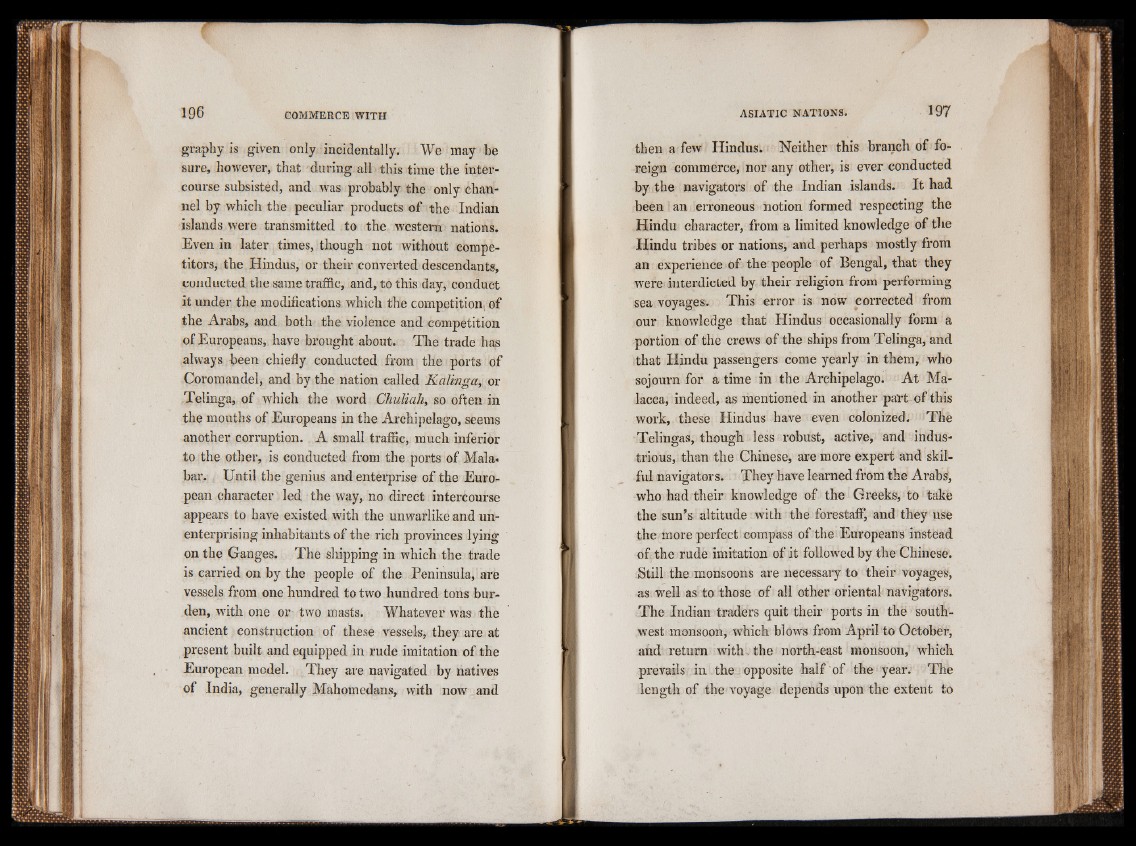
graphy is given only incidentally. We may be
sure, however, that during all this time the intercourse
subsisted, and was probably the only channel
by which the peculiar products of the Indian
islands were transmitted to the western nations.
Even in later times, though not without compe-
titors, the Hindus, or their converted descendants,
conducted the same traffic, and, to this day, conduct
it under the modifications which the competition, of
the Arabs, and both the violence and competition
of Europeans, have brought about. The trade has
always been chiefly conducted from the ports of
Coromandel, and by the nation called Kalinga, or
.Telinga, of which the word Chuliah, so often in
the mouths of Europeans in the Archipelago, seems
another corruption. A small traffic, much inferior
to the other, is conducted from the ports of Mala«
bar. Until the genius and enterprise of the European
character led the way, no direct intercourse
appears to have existed with the unwarlike and unenterprising
inhabitants of the rich provinces lying
on the Ganges. The shipping in which the trade
is carried on by the people of the Peninsula, are
vessels from one hundred to two hundred tons burden,
with one or two masts. Whatever was the
ancient construction of these vessels, they are at
present built and equipped in rude imitation of the
European model. They are navigated by natives
of India, generally Mahomedans, with now and
then a few Hindus, i Neither this branch of foreign
commerce, nor any other, is ever conducted
by the navigators of the Indian islands. It had
been an erroneous notion formed respecting the
Hindu character, from a limited knowledge of the
Hindu tribes or nations, and perhaps mostly from
an experience of the people of Bengal, that they
were interdicted by their religion from performing
sea voyages. This error is now corrected from
our knowledge that Hindus occasionally form a
portion of the crews of the ships from Telinga, and
that Hindu passengers come yearly in them, who
sojourn for a time in the Archipelago. At Malacca,
indeed, as mentioned in another part of this
work, these Hindus have even colonized. The
Telingas, though less robust, active, and industrious,
than the Chinese, are more expert and skilful
navigators. They have learned from the Arabs,
who had their knowledge of the Greeks, to take
the sun’s altitude with the forestaff, and they use
the more perfect compass of the Europeans instead
of the rude imitation of it followed by the Chinese.
Still the monsoons are necessary to their voyages,
as well as to those of all other oriental navigators.
The Indian traders quit their ports in the southwest
monsoon, which blows from April to October,
and return with, the north-east monsoon, which
prevails in the opposite half of the year. The
length of the voyage depends upon the extent to